#meta conversation
Text
@sun-flowerfields asked: ❛ do you think even the worst person can change…? That everybody can be a good person, if they just try? ❜
“Yes, if there’s a change of heart, I believe any person can be a good person. My question is if they deserve a chance. What do you think? Do they?“ His intonation is casual, the query tentative. Gazing down, it appears his black eyes are closed, though at close proximity one caught Tenzo peeking at his counterpart.
1 note
·
View note
Text
Kirishima to Mina:
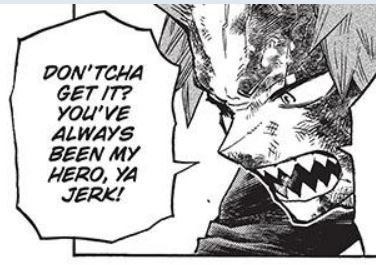
Yoichi to Kudo:
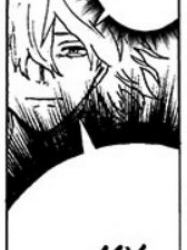
Interesting parallel between two pairs who have a lot in common with our main characters. Something you want to tell us, Horikoshi?
#mha#bnha#bnha spoilers#mha spoilers#bnha 413#mha 413#bkdk#bakudeku#kirimina#kudoichi#bnha meta#mha meta#kinda#this could be used in a meta post about admiration and inspiration that i'm sure plenty of people have already written#i imagine we might get a post-war conversation between them about it
459 notes
·
View notes
Text
Disco Elysium has a lot of fascinating fictional technology but I have been rotating the radiocomputer in my mind for months now. From what I can gather, they operate in a way very similar to modern cloud computing. It doesn't seem like the mainframes we interact with have any processing capability. Instead, they use antennas to process "on air":
SOONA, THE PROGRAMMER - "Alright, well... All radiocomputers perform operations up on air, so in order to gain more processing power you need to invest in a *good antenna*."
The only information we get about what "on air" really means is from the same conversation with Soona:
YOU - "Wait, what's 'on air'?"
SOONA, THE PROGRAMMER - "On the *front*. The unified front of radiowaves, licensed and controlled by Lintel in the East-Insulindic region."
SOONA, THE PROGRAMMER - "It's all around us," she waves her hand, "that's what 'on air' means."
The nonspecific language used here really invokes cloud computing to me. I think there are two main possibilities for how this could work, one being much more likely than the other.
The more likely answer is that information is sent to and from the in-game equivalent of data centers, which would host massive computers with processing capabilities. I'm not sure what their processors would look like, but they'd almost certainly be analog (the lost Feld tape computers are most likely the in-game equivalent of early digital computers).
The significantly less likely (but more interesting) answer is that in-game radio waves are somehow capable of processing information on their own. I have no idea how this would work, and as far as I know there's no real-world analog. But it's clear the world of Disco Elysium has some crazy things happening with radio waves (see how they interact with the pale), so I'm not ruling it out entirely.
The filament memories are like hard drives, but my guess is they would function more similarly to an optical disc (CDs, DVDs), which use patterns in the disc to encode information that's read using lasers or light. The filaments glow inside the mainframe, so it's not a huge leap to assume they're read using light.
The amount of thought put into radiocomputers is so fascinating. As far as I can tell, their version of the internet has been wireless from the get-go, which makes perfect sense! Antennas and other wireless radio technologies would have to be pretty damn powerful to communicate across and force dimensions on the pale. And you have to assume huge amounts of government money has gone into funding their research and development for those purposes. The technology of radiocomputers is so tailored to the world of Disco Elysium, and it's been a lot of fun trying to untangle how exactly they would work.
#i would loooove to hear other people's thoughts on this!! i tried to find conversations abt it and didn't come up with much#also if anyone wants me to elaborate on the feld tape computer thing lmk... its a long post so i didn't want to go into more detail#but i do have Thoughts about it#cyan.txt#disco elysium#disco elysium meta#soona the programmer
541 notes
·
View notes
Text
reading xie lian’s POV is actually hilarious once you realise xie lian isn’t oblivious at all, he basically guesses most things immediately, he’s just taken the veteran autism tactic of “it’s too much effort to figure out when it’s appropriate to mention that i know something, so i’ll just pretend i don’t know until someone says it aloud”. sometimes it turns into a bit. the truth might be embarrassingly obvious, but social cues are hard, and xie lian has infinite time to wait for the other person to blink first.
#tgcf#autistic xie lian#xianxia jesus#meta stuff#like. he knows. for a great many things he knows instantly#and acts like he knows#but he’s not going to be the first to acknowledge it#because as an Autistic he has no sense of scale whether he has like. reasonable ground to say things.#like he’s old enough that i’m sure he could figure it out if he tried#but he’s tired he prefers to wait#like he knew who hua cheng was from the second he got on the ox cart#that’s why he baited hua cheng into the conversation#and hua cheng also knew this that’s why he let himself be drawn in#like. they’re 800 year old gods they know this#but also xie lian is like. is it rude to call him out. i have no idea.#so he kind of pokes around for evidence that would give him an excuse to admit he knows it’s hua cheng#but then when fengqing show up it’s funnier to pretend he doesn’t know#like. never say that xie lian isn’t committed to the bit in his old age
787 notes
·
View notes
Text







do you want to be taken care of?
ONLY FRIENDS | EPISODE 11
#only friends#only friends the series#ofts#onlyfriendsedit#jennie panhan#tee teeradej#GOD. GOD. *head in hands*#oh no- i feel an entire meta piece from a 3 sentence conversation coming#tusersilence#mjtag#asiandramanet#asiandramasource#asiandramaedit#asianlgbtqdramas#mor gifs only friends
448 notes
·
View notes
Text
I've been stuck on viewing Maggie as Crowley's mirror, and for most of the show I like that interpretation. But once I started thinking of Nina as Crowley's Mirror in the ball scene specifically, I made a connection....
Aziraphale is playing God here. He has a vision- a happy romantic evening where people speak Victorian English, dress nicely, dance, and fall in love -and he wills everyone present to conform to his plan. But Nina doesn't conform. Nina feels like something isn't right. She asks questions.
She asks Aziraphale what's going on, why she doesn't feel sad when she knows she's sad, and Aziraphale doesn't give her a satisfactory answer. He tells her that the important thing is that she's here. She's here to play a role in his great plan. To dance in his ball.
So she expresses her concerns to Maggie. Maggie hadn't seen the issues at first, but she listens to Nina, and Nina gets her to acknowledge the absurdity of the situation just a little bit. Listen to their conversation at the dance again. It sounds SO MUCH like the conversations we've heard Crowley and Aziraphale have a thousand times during their 6000 year dance. Crowley calling out heaven, asking questions, trying to get Aziraphale to consider the absurdity of it all. Aziraphale mostly defending heaven, but listening, and sometimes acquiescing.
And this all falls in line with a point I've made before - In season 2, Crowley's relationship with Aziraphale begins to mirror his relationship with heaven. Aziraphale shows a pattern of not listening to Crowley the whole season, but especially in this scene. Crowley tries to ask him what is going on, and alert him to very real danger, but Aziraphale is dismissive. He is blinded by his desire to see his plan to fruition.
And just so we're clear, this is not an Aziraphale hate post. Rather, I think it might give us some insight into where God is coming from. Because Aziraphale's actions may be dismissive and controlling, but they are motivated by love. Misguided, certainly, but with all the best intentions. I have a feeling, when we finally meet God, it will be a similar story. And maybe both She and Aziraphale will learn that sometimes to love means to let go.
#keeping this post short because if I think about it too much I'm going to make myself sick#like how Maggie and Nina's conversation happens while dancing#and aziraphale and crowley have been having that same conversation and doing the same dance for 6000 years#it's so romantic and heartbreaking and poetic I think I might actually die#Also... think about how Lindsey broke up with Nina right before this scene#kind of like how heaven broke up with Crowley before the earth began fuck fuck fuk#and then Crowley yells at Nina to trust someone for once in her life like...#he knows nothing about her he's projecting SO HARD#good omens#good omens 2#good omens season 2#gos2#good omens meta#ineffable husbands#aziraphale#aziraphale x crowley#crowley#crowley x arizaphale#aziracrow#neil gaiman#go2#maggie and nina#reposting slightly edited because I made a mistake the first time#thank you @tip-top-tickety-boo for pointing it out!
642 notes
·
View notes
Text
the truth is that bells hells can talk all they want about being on the same page and sacrificing themselves for this greater cause but they haven't even figured out that they're all part of this cause for different reasons. and orym choosing to go on this mission because he lost his family to these people and he believes this group is the only one who can help save the world and his leader is asking him to is very different from imogen choosing to go on this mission because she eventually realized she could never, ever hope to outrun something that has been haunting and chasing her her entire life.
orym is asking for her to be ready to face the worst case scenario head-on because this is war, but for orym the worst case scenario is failure. for imogen the worst case scenario is far beyond that – it's giving up her soul to this entity and becoming complicit if not an active participant in the methodical destruction of the world. and it's betraying the warnings her mother has given her for years, and it's living but completely losing herself in the process, all in an attempt to protect a world that has been nothing but cruel to her and a pantheon of gods that has never loved her.
and how would she face the fact that she's spent so much time and energy trying to convince herself that her mother can't be saved and her mother is the enemy, with this external pressure from both the party and the most powerful people in the world that she has to be ready to kill her? what do you do when you've forced yourself to hate your own mother and end up becoming just like her anyway? and how can you possibly risk giving in when giving in would mean that you hated your mother for nothing?
and ashton says let's not pretend this isn't going to happen one way or another. when imogen has been desperately clinging to the hope that she can resist this and that she has a future, a life after this where she can live in a cottage with the love of her life and she can have peace. when imogen has believed with her whole being that losing laudna to delilah isn't an inevitability, and all she wants is the rest of the party to do the same for her and predathos, and they just won't. and then wonder why she is so terrified of facing predathos when he tempts her with the rarest, simplest pleasures of belonging, of being understood, of being believed in.
#i've seen a million posts about orym being Sad Boi in this conversation but i've seen next to nothing about imogen#obviously these characters are complicated and that's why we love them but i'm also here to say that they are being Unfair to her.#i wrote and deleted 3 meaner versions of this post before i wrote this one. dkfjskdfjsdf#text#nova shh#critical role#cr3#cr meta#cr spoilers#imogen temult#predathos cr#liliana temult#orym cr#r: imogen x orym#angst tag
398 notes
·
View notes
Text
Like, Sol should be shitting his pants right now.
Ankarna's name being back in the world right now is a massive red flag because even though they are mostly dead, it's pretty clear someone has used their rune in multiple places to accomplish work in their deadname.
Ankarna already has believers.
I thought you were dead says Cassandra right before she shatters.
And already, Kristen is talking about trying to make sure Cassandra isn't corrupted, but more than that, she wants to save Ankarna the way she saved Cassandra.
Buddy Dawn, Kristen's parents, have all confirmed that Helio isn't doing well because he's lost his chosen. There is pressure for Kirsten to return to Helio.
I'm very curious what lie Galacaea will tell Tracker the next time they commune. What kind of pressure will she put on Tracker to convince Kristen to return to Sol Helio and give up on Cassandra?
Because if anyone can radically change the pantheon of her world, it is Saint Kristen Chilis Applebees and Sol fucking knows it.
#dimension 20#dimension 20 spoilers#fantasy high junior year#fhjy spoilers#this is how i meta#i cannot wait to meet ankarna#i wish kristen could talk to cassandra about her#i think it would be such a soft conversation
196 notes
·
View notes
Text
okay okay so corona and ianthe's mother's name is canonically "violabeth" (whence "coronabeth" gains the "beth"). viola is latin/italian in origin, meaning purple; corona means crown or wreath. congrats, your third house monarch (whose assigned house colour is purple) is called purplebeth and crownbeth
but also! in pondering this, my mind was also drawn to viola from shakespeare's twelfth night - one half of a pair of twins, forced by circumstance to take on the guise of her brother for her own safety. we talk and talk abt who out of ianthe and corona came up w the "corona should pretend to be a necromancer" scheme, and also who enforced it; but is it not fucked up if it was violabeth? (especially considering ianthe specifies their father as the one who "wanted a matching set") and if it wasn't, isn't it still fucked up that, based on literature that existed before the houses, their mother's name is all but a prophecy?
#fuck off lou#my post#tlt#the locked tomb#tlt meta#just got SO distracted from what i was writing by this brain wave#also if someone else has said this i am so sorry for repeating the sentiment#violabeth tritos#ianthe tridentarius#coronabeth tridentarius#also suddenly thinking abt ianthe wearing a literal laural WREATH during the socratic conversation in tug#and speaking in quotation marks to give clearly scripted answers#AS IF SHE WERE ACTING LIKE CORONABETH
480 notes
·
View notes
Text

this says a lot about Snape's character development for me. There are many parallels drawn throughout the series between Harry and Snape; obviously, they're very different characters but there are similarities too.
I think here Snape is talking about himself. The teenaged Snape we see in the Pensieve is very much like this- emotional, heart on his sleeve, easily provoked, a definite wallower in sad memories... weak. Adult Snape, though he retains some of these characteristics that do emerge in stressful moments (in PoA we see how angrily he reacts to Sirius's escape, for instance) on the whole is a great deal more thoughtful, reserved, calculating, measured.
I think that Snape at some point had to force himself to become this. I think he actually relates to Harry here, and is giving him advice based on personal experience. In my fic he begins to learn to control his emotions partially out of a desire to protect Lily; he's fully aware that she's his weakness (or really, his strength, viewed a different way) and that openly displaying any sort of emotion towards her at all makes her vulnerable to the likes of Avery and Mulciber, who will have the perfect weapon to get to him if they want to.
Severus doesn't have the advantages of his peers, he's not pureblood, he wasn't born into money. If he wants to join the Death Eaters and rise in their ranks, he needs to be subtle, cunning, careful. he can't afford to be careless and entitled like mulciber or bellatrix or even sirius. what he's got to offer isn't his name or his money, it's his sheer talent and cleverness. moving on:
When Voldemort decides to go after Lily this becomes even more important. Imo the reason why Voldemort believes that Snape only "desired" Lily is because that's what Snape told him. He lied to Voldemort's face and told him something probably disgusting tbh because that's the only way Voldemort would accept it and agree, if it was a selfish, callous request that Voldemort could understand. We can see evidence of this here:

Asking Voldemort to spare a mudblood because he was in love with her would likely not have gone over well- and as we know, Voldemort actually bore his request in mind, though obv didn't give enough of a fuck about Snape to follow through. Because although asking voldemort to spare her must have taken serious balls, Snape's mistake here was trusting someone inherently selfish to do something selfless for him.
Clearly he immediately realises this and goes to Dumbledore, which is when controlling his emotions becomes of paramount importance, because now he's working against perhaps the most highly accomplished legilimens of all time.
It's also interesting to me that Snape in this conversation is probably the character who is most forthright and informative with Harry in the whole of OotP until Dumbledore at the end; Harry actually learns a lot in this conversation. And Snape also kind of gives him credit which is interesting too:


like for Snape that's high praise lmao. A shame because if he wasn't so bitter (i.e. didn't wear his heart on his sleeve so much around harry) then he might have actually been pretty helpful to Harry and a decent teacher. Again, during the Occlumency lessons his unrestrained emotion brought up by memories of James is a hindrance. He defies Dumbledore's orders to teach Harry Occlumency because of his emotional response to SWM, as well as honestly doing kind of a shit job before that (by not being empathetic and teaching Harry in a way that would've been actually productive.)
At this point Dumbledore believes that Harry learning Occlumency and controlling his emotions is of vital importance; he turns out to be wrong about this. In Harry's case, it turns out to be his emotional nature that saves him- unlike Snape, who is the opposite. Snape's journey is about learning that some things are more important than his selfish need to give into his own emotions.
By DH Snape's learned this lesson fully; his old hatred for James doesn't stop him from doing what has to be done, from giving Harry the tools he needs. Even in the final moments of his life, he can look past James and see Lily in Harry- and, by giving Harry the information that leads to his self-sacrifice, he can let her go.
#sorry if this is kind of incoherent lmao its late#but this occlumency scene is so good tbh. the conversation between them is rly interesting#severus snape#meta#honestly the way snape views harry must be so complex and contradictory like no wonder he cant get a grip when harrys around lol#SORRY this got so long rip#severus
296 notes
·
View notes
Text
I’ve mentioned this elsewhere but it feels relevant again in light of the most recent episode. Something that’s really fascinating to me about Orym’s grief in comparison to the rest of the hells’ grief is that his is the youngest/most fresh and because of that tends to be the most volatile when it is triggered (aside from FCG, who was two and obviously The Most volatile when triggered.)
As in: prior to the attack on Zephrah, Orym was leading a normal, happy, casual life! with family who loved him and still do! Grief was something that was inflicted upon him via Ludinus’ machinations, whereas with characters like Imogen or Ashton, grief has been the background tapestry of their entire lives. And I think that shows in how the rest of them are largely able to, if not see past completely (Imogen/Laudna/Chetney) then at least temper/direct their vitriol or grief (Ashton/Fearne/Chetney again) to where it is most effective. (There is a glaring reason, for example, that Imogen scolded Orym for the way he reacted to Liliana and not Ashton. Because Ashton’s anger was directed in a way that was ultimately protective of Imogen—most effective—and Orym’s was founded solely in his personal grief.)
He wants Imogen to have her mom and he wants Lilliana to be salvageable for Imogen because he loves Imogen. But his love for the people in his present actively and consistently tend to conflict with the love he has for the people in his past. They are in a constant battle and Orym—he cannot fathom losing either of them.
(Or, to that point, recognize that allowing empathy to take root in him for the enemy isn't losing one of them.)
It is deeply poignant, then, that Orym’s grief is symbolized by both a sword and shield. It is something he wields as a blade when he feels his philosophy being threatened by certain conversational threads (as he believes it is one of the only things he has left of Will and Derrig, and is therefore desperately clinging onto with both bloody hands even if it makes him, occasionally, a hypocrite), but also something he can use in defense of the people he presently loves—if that provocative, blade-grief side of him does not push them—or himself—away first.
(it won’t—he is as loved by the hells as he loves them. he just needs to—as laudna so beautifully said—say and hear it more often.)
#critical role#cr spoilers#bells hells#orym of the air ashari#cr meta#imogen temult#ashton greymoore#liliana temult#this is genuinely completely written in good faith as someone who loves orym#but is also about orym and so will inevitably end up being completely misconstrued and made into discourse. alas#I could talk about how Orym’s unwillingness to allow the hells to actually finish/come to a solid conclusion on Philosophy Talk#is directly connected to one of the largest criticisms of c3 (that they are constantly having these conversations)#all day. alas. engaging with orym’s flaws tends to make people upset#it is ESP prevelant when he walks off after exclaiming ‘they (vangaurd) are NOT right’#which was not only never said but wasn’t even what they were talking about#he even admits as much to imogen like ten minutes later! that he is incapable of viewing it objectively#which is 100% justifiable and understandable but simultaneously does not make his grief alone the most important perspective in the world#also bc i fear ppl will play semantics on my tags yes the line ‘i hope she’s right’ was said but it was from ASHTON#who does not believe they are at all and wasn’t saying they actively WERE right. orym just heard something to latch onto and ran with it#ultimately there is a reason orym only admitted that he was struggling when he had stepped away to talk to dorian#who has not been around and thusly has not changed once n orym's eyes#and it isn't that the hells never check in or care. they do. they have several times over#it is dishonest to say they haven't#the actual reason is that all of this is something He Is Aware Of. he doesn't mention it bc he KNOWS it's hypocritical and selfish#he says as much!#EXHALES. @ MY OWN BRAIN CAN WE THINK ABT MOG AGAIN. FYRA RAI EVEN. FOR ME.#posting this literally at 8 in the morning so I can get my thoughts out of my brain but also attempt to immediately make this post invisibl
154 notes
·
View notes
Text

They could have been BFFs
#danny phantom#vlad masters#jazz fenton#meta#danny breaks down vlad's front door to find his arch nemesis & his big sister#wearing matching pink bathrobes & spa masks & painting each other's nails#while having an absolutely incomprehensible conversation about medieval eastern european architecture#(does jazz even have any friends? is she one of those lonely gifted kids?)#she & vlad are both so chatty & gregarious. same strong/overbearing bulldozer personalities#their mall crawls would be epic#& with jazz's penchant for psychology vlad would be an endless source of intrigue#vlad sobbing on the phone‚ eyeliner smeared down his cheeks: i just don't know what to do jasmine#jazz: *sighs and pulls her dsm-v off the shelf*#whenever jazz has had her fill of her family's insanity#she goes & spends the weekend with vlad#because his brand of insanity is different & she needs a break#plus vlad makes the best roszke
1K notes
·
View notes
Text
In discussions about the finale of Black Sails, one of the things I often see is folks hard-focusing on Flint's fate, in an either-or binary fashion, usually presented as "Which do you believe-- that Silver killed him? or sent him to the plantation?"
Now, for posterity's sake, gonna mention a few things-- first off, that's simply not thinking broadly enough. There are farrrr more than two options here and I've come up with my share of the reallyyyyy bad ones for sure. Whatever your mind chooses, none of those are happy endings anyway, there are bittersweet, bad, and worse endings all the way down. (They are paused, they are in a time loop, and also all endings and no endings are happening simultaneously)
But also, the more cogent point is that, it doesn't actually matter what happened *to Flint* The story is... not actually about him at that point. We have transitioned from Flint as protag to Silver as protag, setting up for (the fanfiction that Black Sails has ended up making of, ugh, king shit) Treasure Island.
And so, I just, don't find it to be of particular interest exploring what we think Flint is actually doing or if he's alive for real. What is EXTREMELY interesting to explore though is how Silver's speech at the end to Madi is sort of giving Thomas back to Flint as a pacifier/comfort object, but how... Silver is giving Flint that thing in his own mind as his own type of pacifier/comfort object.
That's the REALLY chewy bit. What actually happens to Flint is not the purpose of that scene for me, of Silver's recounting of events to Madi. It's more about... projection. It's about how Silver is dealing with whatever happened to Flint/whatever he did.
And I just feel like it's missing the point to focus so hard on if Flint is alive or not.
He is the ghost of the story regardless, that's what's important. He's going to haunt the narrative for the rest of everyone's lives. No one has been untouched or unscarred by coming into contact with Captain Flint; he has a forever legacy. I'm not the first to call him this, but he's Schrödinger's Flint and he's staying that way.
But this?
"No. I did not kill Captain Flint. I unmade him. The man you know could never let go of his war. For if he were to exclude it from himself, he would not be able to understand himself. So I had to return him to an earlier state of being. One in which he could function without the war. Without the violence. Without us. Captain Flint was born out of great tragedy. I found a way to reach into the past... and undo it.
There is a place near Savannah... where men unjustly imprisoned in England are sent in secret. An internment far more humane, but no less secure. Men who enter these gates never leave them. To the rest of the world, they simply cease to be.
He resisted... at first. But then I told him what else I had heard about this place. I was told prominent families amongst London society made use of it. I was told the governor in Carolina made use of it. So I sent a man to find out if they'd used it to hide away one particular prisoner. He returned with news. Thomas Hamilton was there. He disbelieved me. He continued to resist. And corralling him took great effort.
But the closer we got to Savannah, his resistance began to diminish. I couldn't say why. I wasn't expecting it. Perhaps he'd finally reached the limits of his physical ability to fight. Or perhaps as the promise of seeing Thomas got closer... he grew more comfortable letting go of this man he created in response to his loss. The man whose mind I had come to know so well... whose mind I'd in some ways incorporated into my own. It was a strange experience to see something from it... so unexpected.
I choose to believe it... because it wasn't the man I had come to know at all... but one who existed beforehand... waking from a long... and terrible nightmare. Reorienting to the daylight... and the world as it existed before he first closed his eyes... letting the memory of the nightmare fade away.
You may think what you want of me. I will draw comfort in the knowledge that you're alive to think it. But I'm not the villain you fear I am. I'm not him."
This is the speech of a man who is self-soothing, who is spinning himself a tale, who is projecting, who is coping.
and THAT is just, way chewier, innit?
#Now that's just from a canon point of view#once we start to delve into like fan fiction#Because fic must necessarily change the story and change canon because it's creating something new#so of course then figuring out what you want to do with flint post canon is necessary#but for me fanfiction is a different realm than canon only based meta conversations about the show#black sails meta#long post#black sails#john silver#james flint#thoughts#black sails spoilers#I was coaxed into writing my group chat meta into a post by the Committee mwah
495 notes
·
View notes
Text
Aziraphale's talk with the Metatron
Another unhinged meta post for the Aziraphale Defense Squad. I will continue to defend him hardcore until fandom starts recognizing him as his own person and not a prop for Crowley's character. Welcome to my opinion on the Final Fifteen!!
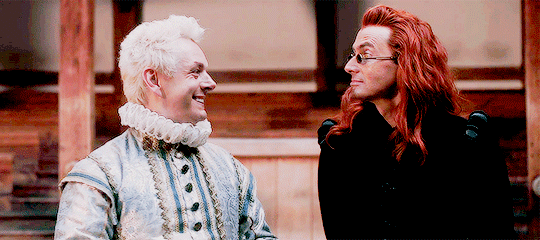
Hell came to Earth.
Aziraphale blew up his halo while surrounded by Hell.
Aziraphale declared a war on Hell at the exact moment Crowley was in Heaven uncovering Heaven's secrets.
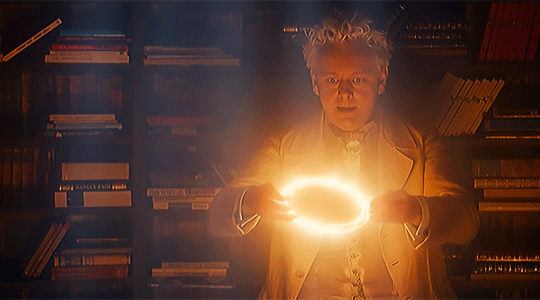
There was a door to Heaven opened through the bookshop and who knows what in the Discorporated Demon the guy at the other end of that door was getting.
Enough to get The Metatron's attention and for him to witness Aziraphale declare war on Hell while his demon boyfriend breaks into Heaven's top secret files and learns that Heaven is holding their rebellious angels hostage.
He doesn't give Aziraphale a chance to say no to Heaven, and Aziraphale is pissed off about it.

Aziraphale DID NOT SAY YES EITHER. It is so very important that people understand this. The Metatron did not give Aziraphale a choice. Aziraphale had to choose the best way to handle a hopeless situation.
I think Aziraphale is waiting for Crowley to get the hint.
Crowley broke into Heaven. He broke into Heaven. He uncovered secrets. Saraqael showed him the trial. He knows the truth.
Aziraphale almost started a war to protect Gabriel.
The Metatron had to intercept that last transmission because Crowley and Aziraphale are powerful enough to shield Earth from both sides.
Remember that during the Bullet Catch scene, Aziraphale asked a group of soldiers to raise their hands if they had experience using firearms. Crowley is the only one who did not raise his hand because he had never fired a gun before.
Now we get to the present, and The Metatron is basically telling Aziraphale that Crowley is not only a threat but there is evidence of the fact that they have been working together for 6,000 years and that he prevented Crowley's arrest by Hell in 1941.
As far as The Metatron is concerned, Aziraphale just committed an act of treason because it helped Crowley get out of Heaven safely with highly classified information.
He didn't know Crowley was in Heaven. Crowley never came back and it made him fear the worst, but then he's showing up with Heaven right after and that only makes it a bigger problem.
Aziraphale chose to keep the peace instead of allowing one side or the other to arrest Gabriel and Beelzebub. He let the former Supreme Archangel and former Grand Duke of Hell escape from their duties. He gave them a choice. They were never supposed to know those choices existed in the first place.
The way that The Metatron said "so predictable" when Nina told him that no one ever asked for Death. The invisible choice. The name of the coffee shop is used as a threat against Aziraphale.
Aziraphale's choice in this situation involved how he chose to present it to Crowley.
Crowley was asking to get his flat back after Shax made the plan to go back to Hell. He was already planning to take Aziraphale to the Ritz to celebrate by getting really drunk. He was fine.
Nina and Maggie's last minute interception got him all hyped up to finally make a love confession.
But please FOR THE LOVE OF GOD can we please try to remember that AZIRAPHALE NEVER SAID YES EITHER.
He seems to be turning himself in and trying to protect Crowley, and only realizes at the end that the Metatron plans to use him against humanity.
Crowley and Aziraphale were not having the same conversation. They were not having the same conversation. They were not having the same conversation.
Aziraphale is terrified. Look at the nervous smile and the way he is so confused as to why Crowley is mad at him. He's trying to tell Crowley he needs helps because he's in trouble.





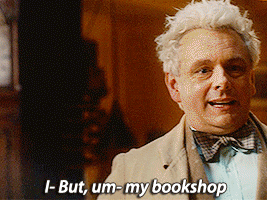
He said he didn't want to go back to Heaven. He made this clear when he was speaking to Crowley.
He knows the things he is saying are contradictory to what he's learned, and he's needing Crowley to pick up on that. He's trying to tell Crowley that he can't protect him from Hell this time anymore than Crowley can protect him from Heaven because The Metatron knows they've been working together for 6,000 years and are now in a position to reveal Heaven's institutional problem.
Stop getting mad at Aziraphale for not saying no and start asking yourself why some of you refuse to acknowledge the fact that Aziraphale did not say yes to the Metatron either.
Especially knowing that Crowley did not say "yes" or "no" to Hell's offer in The Arrival either.
This isn't an angel who is happy to go back to Heaven. This is an angel begging his best friend to help him because he doesn't have a choice, and not understanding that Crowley thinks Aziraphale is rejecting him and Aziraphale is telling him he no longer has a choice.
He no longer has a choice and now Crowley is upset with him and he's still trying to figure out what just happened.
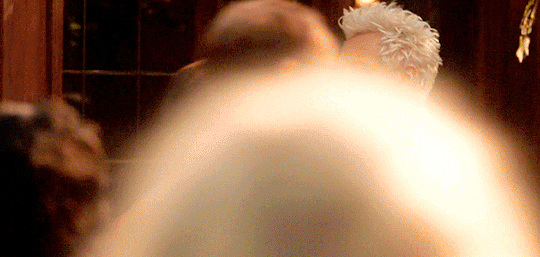
Aziraphale is going to get up there and cause some trouble though.
#good omens#good omens meta#aziraphale defense squad#aziraphale#crowley#final fifteen#behold my opinion on aziraphale's perspective#i love crowley#but there is more than one conversation happening#more than one story#more than one perspective
218 notes
·
View notes
Text
Guillermo must read like a Southern Gothic post to his entire family.
Imagine your only kid has been married to his work in food service/the railroad/food service at the railroad? for fifteen years and it's the reason he never sees you. One time he came home and said he could get you a mini-fridge from his friend who was once dead but it's fine now. He left to go get it and didn't come back. Some people are filming the whole time.
Another time he disappeared to London for a year, and when he came back he finally let you see his house. It's a trash-covered mansion with a tree through the ceiling. He appears to live there by himself. He's exchanged his sweaters for Versace and a watch that's more expensive than God. He tells you he's gay, which you knew, even though you've never talked about it and he's been sending you photos of some woman you haven't met (you think?) for years. Some people are again filming, this time for his grandma's birthday, except there's no cake or presents and you never see a copy of the videotape.
He bought you a house last year. But the first time he's come for your birthday in three or four years he doesn't bring a gift, and spends the time frantically whispering to someone on the phone. The people are still filming him. It's been like five years of them filming him. He's in the sweaters again.
He tells you he can't say why or what's going to change for him, but he can never see you again. You ask if what he's doing is making him happy but don't give him time to answer. It's the first direct question you've really asked him all evening. Then you ask him where his crucifix is. He needs one, it'll help. It's really important that he have one, and he keeps losing them. So scatterbrained. This is what will make it better.
(You don't see his face as you force the chain around his neck. You don't see him disappearing before your eyes. Was it always this way, with you two, or did it happen over time?)
You casually tell the cousin who's been lecturing him all night that he comes by weekly now to say goodbye forever. Your sweet boy, so dramatic, even as a child. So mysterious. You just don't know what he's thinking. But he'll be back.
#i know there's rule of comedy and cultural markers that aren't my background and stuff#(and also that we learn it's not the first time they've had the conversation)#but i feel like guillermo learned how to shop at the emotional repression store really young#anyway if he were my kid i'd be scared he was drug trafficking#fandom: wwdits#what we do in the shadows#wwdits#guillermo de la cruz#char: guillermo the relentless#i am a meta gremlin
500 notes
·
View notes
Text
I have a lot of complicated feelings when it comes to what Neflix has done with the Witcher, but my probably least favourite is the line of argumentation that originated during shitstorms related to the first and second season that I was unlucky to witness.
It boils down to "Netflix's reinterpretation and vision is valid, because the Witcher books are not written to be slavic. The overwhelming Slavic aestetic is CDPR's interpretation, and the setting in the original books is universally European, as there are references to Arthurian mythos and celtic languages"
And I'm not sure where this argument originated and whether it's parroting Sapkowski's own words or a common stance of people who haven't considered the underlying themes of the books series.
Because while it's true that there are a lot of western european influences in the Witcher, it's still Central/Eastern European to the bone, and at its core, the lack of understanding of this topic is what makes the Netflix series inauthentic in my eyes.
The slavicness of the Witcher goes deeper than the aestetics, mannerisms, vodka and sour cucumbers. Deeper than Zoltan wrapping his sword with leopard pelt, like he was a hussar. Deeper than the Redanian queen Hedvig and her white eagle on the red field.
What Witcher is actually about? It's a story about destiny, sure. It's a sword-and-sorcery style, antiheroic deconstruction of a fairy tale, too, and it's a weird mix of many culture's influences.
But it's also a story about mundane evil and mundane good. If You think about most dark, gritty problems the world of Witcher faces, it's xenophobia and discrimination, insularism and superstition. Deep-seated fear of the unknown, the powerlessness of common people in the face of danger, war, poverty and hunger. It's what makes people spit over their left shoulder when they see a witcher, it's what makes them distrust their neighbor, clinging to anything they deem safe and known. It's their misfortune and pent-up anger that make them seek scapegoats and be mindlessly, mundanely cruel to the ones weaker than themselves.
There are of course evil wizards, complicated conspiracies and crowned heads, yes. But much of the destruction and depravity is rooted in everyday mundane cycle of violence and misery. The worst monsters in the series are not those killed with a silver sword, but with steel.
it's hard to explain but it's the same sort of motiveless, mundane evil that still persist in our poorer regions, born out of generations-long poverty and misery. The behaviour of peasants in Witcher, and the distrust towards authority including kings and monarchs didn't come from nowhere.
On the other hand, among those same, desperately poor people, there is always someone who will share their meal with a traveller, who will risk their safety pulling a wounded stranger off the road into safety. Inconditional kindness among inconditional hate. Most of Geralt's friends try to be decent people in the horrible world. This sort of contrasting mentalities in the recently war-ridden world is intimately familiar to Eastern and Cetral Europe.
But it doesn't end here. Nilfgaard is also a uniquely Central/Eastern European threat. It's a combination of the Third Reich in its aestetics and its sense of superiority and the Stalinist USSR with its personality cult, vast territory and huge army, and as such it's instantly recognisable by anybody whose country was unlucky enough to be caught in-between those two forces. Nilfgaard implements total war and looks upon the northerners with contempt, conscripts the conquered people forcibly, denying them the right of their own identity. It may seem familiar and relevant to many opressed people, but it's in its essence the processing of the trauma of the WW2 and subsequent occupation.
My favourite case are the nonhumans, because their treatment is in a sense a reminder of our worst traits and the worst sins in our history - the regional antisemitism and/or xenophobia, violence, local pogroms. But at the very same time, the dilemma of Scoia'Tael, their impossible choice between maintaining their identity, a small semblance of freedom and their survival, them hiding in the forests, even the fact that they are generally deemed bandits, it all touches the very traumatic parts of specifically Polish history, such as January Uprising, Warsaw Uprising, Ghetto Uprising, the underground resistance in WW2 and the subsequent complicated problem of the Cursed Soldiers all at once. They are the 'other' to the general population, but their underlying struggle is also intimately known to us.
The slavic monsters are an aestetic choice, yes, but I think they are also a reflection of our local, private sins. These are our own, insular boogeymen, fears made flesh. They reproduce due to horrors of the war or they are an unprovoked misfortune that descends from nowhere and whose appearance amplifies the local injustices.
I'm not talking about many, many tiny references that exist in the books, these are just the most blatant examples that come to mind. Anyway, the thing is, whether Sapkowski has intended it or not, Witcher is slavic and it's Polish because it contains social commentary. Many aspects of its worldbuilding reflect our traumas and our national sins. It's not exclusively Polish in its influences and philosophical motifs of course, but it's obvious it doesn't exist in a vacuum.
And it seems to me that the inherently Eastern European aspects of Witcher are what was immediately rewritten in the series. It seems to me that the subtler underlying conflicts were reshaped to be centered around servitude, class and gender disparity, and Nilfgaard is more of a fanatic terrorist state than an imposing, totalitarian empire. A lot of complexity seems to be abandoned in lieu of usual high-fantasy wordbuilding. It's especially weird to me because it was completely unnecessary. The Witcher books didn't need to be adjusted to speak about relevant problems - they already did it!
The problem of acceptance and discrimination is a very prevalent theme throughout the story! They are many strong female characters too, and they are well written. Honestly I don't know if I should find it insulting towards their viewers that they thought it won't be understood as it was and has to be somehow reshaped to fit the american perpective, because the current problems are very much discussed in there and Sapkowski is not subtle in showing that genocide and discrimination is evil. Heck, anyone who has read the ending knows how tragic it makes the whole story.
It also seems quite disrespectful, because they've basically taken a well-established piece of our domestic literature and popular culture and decided that the social commentary in it is not relevant. It is as if all it referenced was just not important enough and they decided to use it as an opportunity to talk about the problems they consider important.
And don't get me wrong, I'm not forcing anyone to write about Central European problems and traumas, I'm just confused that they've taken the piece of art already containing such a perspective on the popular and relevant problem and they just... disregarded it, because it wasn't their exact perspective on said problem.
And I think this homogenisation, maybe even from a certain point of view you could say it's worldview sanitisation is a problem, because it's really ironic, isn't it? To talk about inclusivity in a story which among other problems is about being different, and in the same time to get rid of motifs, themes and references because they are foreign? Because if something presents a different perspective it suddenly is less desirable?
There was a lot of talking about the showrunners travelling to Poland to understand the Witcher's slavic spirit and how to convey it. I don't think they really meant it beyond the most superficial, paper-thin facade.
#The witcher#Sorry if its convoluted I just got reminded of something and it made me a little angry#and as I had this conversation a lot of times I've decided to put it into written text#sorry about being bitter#but these are some of my favourite books and I'm still upset when I get reminded how badly they were treated in the recent adaptation#I'm not saying you should never change anything#But it's good to have enough background to understand why some things are the way they are in the original#and to understand what the source material is about#we don't talk about particular character's looks or something (altough I feel they could care more about it too)#but central themes tropes and motifs#long post#it may seem like I'm talking from a high horse here#people are welcome to interpret literature however they want#Nobody has a monopol on themes#I just think that in this particular case the cultural context influences the worldbuilding#and if changed it doesn't have the same impact anymore#meta
153 notes
·
View notes